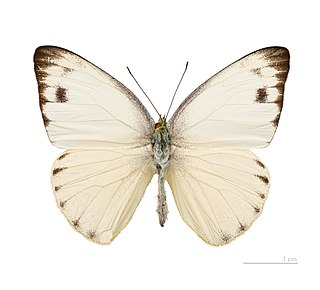
Appias, commonly called puffins or albatrosses, is a genus of butterflies in the subfamily Pierinae (whites) found in Africa and southern Asia.

Pareronia is a genus of butterflies of the subfamily Pierinae within the family Pieridae. The species are found in Southeast Asia and are mimics of the Danainae genus Parantica.

Allotinus is a genus of butterflies in the family Lycaenidae. The genus was erected by Cajetan Felder and Rudolf Felder in 1865. The members (species) of this genus are found in the Indomalayan realm.

Danaus, commonly called tigers, milkweeds, monarchs, wanderers, and queens, is a genus of butterflies in the tiger butterfly tribe. They are found worldwide, including North America, South America, Africa, Asia, Indonesia and Australia. For other tigers see the genus, Parantica.

Doleschallia bisaltide, the autumn leaf, is a nymphalid butterfly found in South Asia, Southeast Asia, and Australasia. In Australia it is also known as the leafwing.

Nacaduba is a genus of gossamer-winged butterflies (Lycaenidae). It constitutes many of the species commonly called "lineblues". As they are the genus initially erected to contain all lineblues, they might be considered the "typical" lineblues, as opposed to the species relatives now separated in Catopyrops, Petrelaea and Prosotas.

Hypochrysops is a genus of butterflies in the family Lycaenidae first described by Cajetan Felder and Rudolf Felder in 1860. This particular genus is exclusive to the Australian area with only a few species straying into Papua New Guinea.

Doleschallia is a genus of butterflies of the subfamily Nymphalinae in the family Nymphalidae. With their wings closed Doleschallia resemble dead leaves. Another Indo-Australian genus Kallima, and the African genera Kamilla, Mallika and Kallimoides are collectively known as dead leaf butterflies.

Taenaris is a genus of butterflies in the family Nymphalidae, subfamily Amathusiinae, that distributed throughout Australasia with a majority of species being located on the island of New Guinea. They are commonly known as the owl butterflies.

The palmflies are a common Asian butterfly genus found from India to the Solomon Islands. The caterpillars mimic leaves which they feed on. The adults mimic certain species.

Jamides cyta, the pale cerulean, is a butterfly of the lycaenids or blues family. It is found throughout South-east Asia, from Malaysia to the Solomon Islands and the Philippines, as well as Queensland in Australia.

Taenaris myops is a butterfly of the family Nymphalidae.

Curetis barsine is a species of butterfly belonging to the lycaenid family. It is found in the Australasian realm.

Taenaris artemis is a species of butterfly in the family Nymphalidae. It was first described by Samuel Constantinus Snellen van Vollenhoven in 1860. It is found in the Australasian realm

Euploea wallacei, is a butterfly in the family Nymphalidae. It was described by Cajetan Felder and Rudolf Felder in 1860. It is found in the Australasian realm The name honours Alfred Russel Wallace.

Paralaxita damajanti, the Malay red harlequin, is an Indomalayan species in the butterfly family Riodinidae. It was described by Cajetan Felder and Rudolf Felder in 1860.















